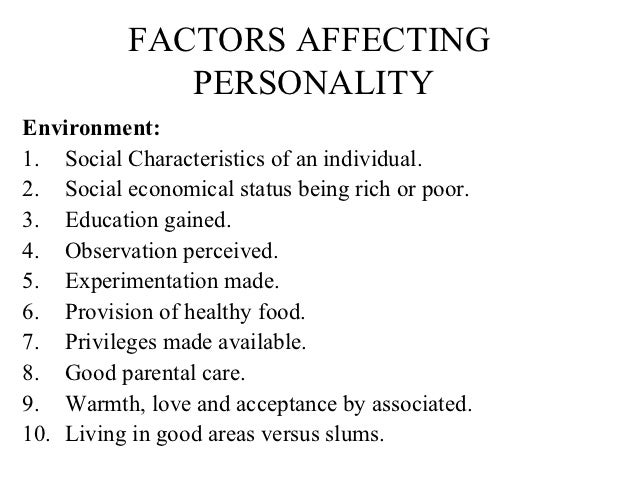Factors Influencing Personality
PERSONALITY
To social scientists, personality is the sum total of behavior, attitudes, beliefs, and values that are characteristic of an individual.
"Personality refers to deeply ingrained patterns – of behavior, which include the way one relates to, perceives, and thinks about the environment and one self"
(American Psychiatric Association (APA) 1987)
Factors Influencing Personality-
- Role of Heredity/Biological
- Environmental Factors
- Family
- Physique
- Teacher
- Sibling Relationships
- Peer Group
- Culture
- Endocrine Glands
- School
- Mass Media
1. Role of Heredity-
The principal raw materials of personality physique, intelligence and temperament are the result of heredity. How they will develop will depend on environmental influences. Many aspects of human behavior and development ranging from physical characteristics such as height, weight, eye and skin color, the complex patterns of social and intellectual behavior, are influenced by a person's genetic endowment.
2. Environmental Factors-

Family-
- The reaction of the family environment towards an individual, and the role of parents, are very important in the molding of personality. Parents serve as a model whom the child imitates, and their influence is considerable on the child. Parents influence the development of a child's personality in a wide variety of ways.
- Over-protective mothers will influence children in the direction of dependence and a total disregard for others. Nagging mothers will cause children to be shy, submissive and emotionally unstable.
- The whole friendly and tolerant fathers help children to have greater emotional stability and self-confidence.
Physique-
An individual with an imposing body-build and a healthy appearance definitely influences those around him. Even if he has not proved himself, yet he gains recognition and status through his physical appearance.
- A peaceful and loving atmosphere results in children being orderly, peace-loving and very affectionate. In a family where there is tension, constant quarrels and incompatibility among parents, the child is likely to develop strong feelings of in security and inferiority.
- The position has a definite influence on personality. The eldest child is very often overburdened with responsibility, hence he grows up to be very independent, while the youngest being the baby of the family is petted and spoilt.
Teacher-
Teacher is the most powerful source of stimulation for the child. If he/she possesses desirable personal and social modes or reactions, he will inculcate them among his students. On the other hand, effects of prejudicial treatment on the part of teachers can make the child lose self-confidence and develop low self-esteem.
Sibling Relationships-
The number of siblings as well as their sex and age has a considerable influence on the development of both favorable and unfavorable personality traits like cooperativeness, sharing, aggressiveness, jealousy.
Peer Group-
Peer group refers to other children of the same age who study with or play with the child. Peer group is much more influential than siblings or parents. The peer group serves as an important reference group in shaping personality traits and characteristics of the growing child.
Culture-
Individuals of certain cultures are more generous, open-hearted and warm whereas individuals of some other cultures are suspicious, introverted and self-centered. It has also been found that certain cultural communities are more prone to develop certain abnormal behaviors as compared to others, probably due to the influence of geographical, dietary, hormonal or genetic influences within the community.
Endocrine Glands-
- The secretions of endocrine glands affect physical growth, emotional growth and mental growth. These will have an impact on the total personality of an individual.
- The thyroid gland secretes a hormone called thyroxin, and the main function of this hormone is regulation of body metabolism. If the thyroid gland is under-active, the result is usually mental dullness, inactivity, depression, fatigue and poor appetite.
- The parathyroid gland regulates calcium metabolism. Excitability of the nervous system is directly dependent on the amount of calcium in the blood. Deficient working of this gland leads to the development of an irritable, distracted, nervous and a tense person.
- Similarly other glands namely pituitary, the adrenal and the gonads have their tremendous impact on various personality traits.
School-
The children spend much of their time in the schools and hence it can play a very large part in the formation of the personality of the child. School will have direct role on child personality-
- The friendships and acquaintances which are made among the children themselves
- The type of curriculum in the schools, which affects the habitual responses of children
- Well-furnished laboratories, adequate playground.
Mass Media-
Mass media includes films, television, radio, printed literature, etc. Mass media has a considerable impact on attitudes, values, beliefs and behavior patterns.